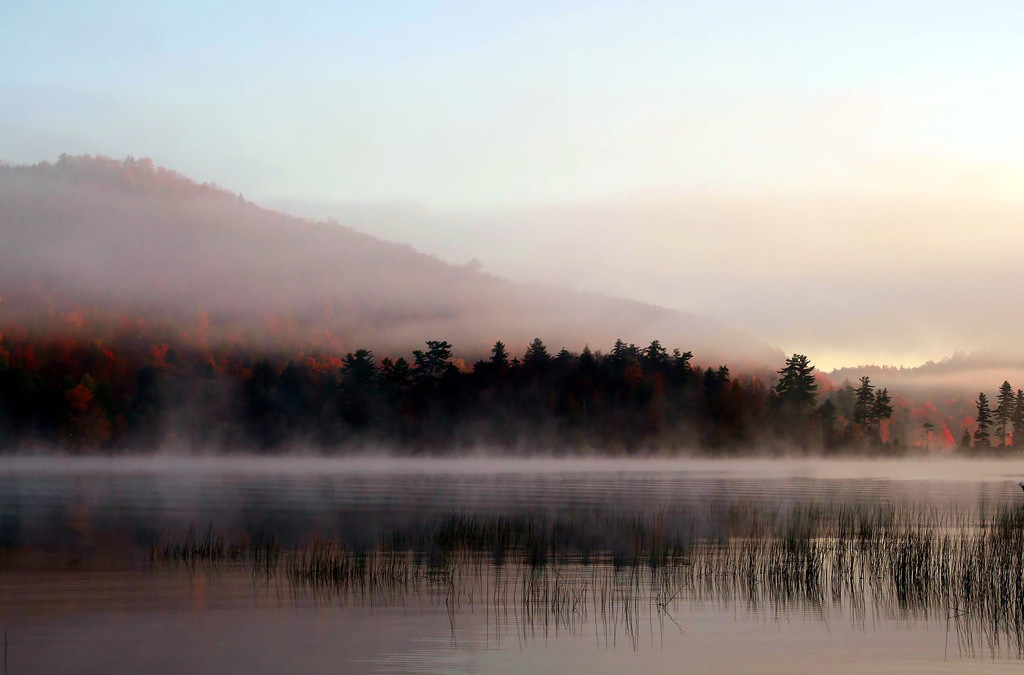I wrote this in September 2011, and I wanted to convey in the simplest way that things change…while not really changing at all. Our family has had camps on a remote Adirondack lake for about 100 years, and they are only accessible by boat. The lake never changes, but we do…
In a misty drizzle the color of an old man’s beard the boat skims north up the lake, the two-stroke outboard straining, the aluminum hull skipping across a light chop and banging like a wind chime made from old metal garbage can lids. I’m young and small, hunched into a ball in the bow, the hood of my yellow raincoat pulled down over my forehead, damp knees knocking, sneakers resting on the wet coils of anchor rope, dripping hands gripping the worn edge of the old wooden seat. When I pick my face up into the wind, the droplets pinprick my cheeks and I clench my eyes and duck back down. Looking backward, out of the wind, I smile as I watch my father sitting tall and resolute on the stern seat, his left hand gripping the outboard’s tiller, staring straight ahead as if this were the sunniest of summer days. Turning back down again into my damp, cramped, huddled little world, the raindrops sliding down my hood and splashing all around me, I think that my father must be the biggest, strongest, bravest man in the world.
A mile farther on, having never dared to look again into the stinging mist, I feel the boat tip and turn to port as we enter the shelter of the darking cove. The whine of the outboard drops in octaves, lower and lower, to a murmur, then coughs twice and the world goes silent, save for the sizzle of the mist peppering the lake — a sound like bacon frying far off.
Looking up, I see our cabin tucked under the fragrant boughs of the balsams, and the needled path that leads between the dripping ferns down to the dock. For a moment it seems as if my father, our boat, and me, are all fixed in place, and that the cabin and the trees and the path and the ferns and the dock are all gliding toward us across the black skin of the lake. When you’re six, it seems as if such things can be so.
The gunwale of the boat and the side of the dock now merge, sliding on parallel tracks just an inch apart, ever slowing until the last possible moment when my father reaches out, the brass catch in his wet fingers, and clips the brass ring with a crisp, metallic click. Seconds later, we hear the click come back to us, softer now as it echoes off the grey silhouette of the hills beyond the far shore.
The boat rocks hard as my father jumps up onto the dock and I hear his footsteps on the damp wood and then I see his boots pointing at me and a moment later I feel his big hands in my armpits, lifting me from my seat, swooping me through the air, planting me firmly on the dock, steadying me while I catch my balance, and then letting me go. “We made it, son,” he says.
Forty-five years later, on the same lake and in the same boat, the same father and son motor north toward the same cabin in the same gray drizzle, the hull making the same aluminum slaps against the light chop. My father is in the bow now, hunched under his raincoat and watching the drops fall from his hood and splash about his feet. My left hand is on the tiller and I’m staring straight ahead into the stinging mist, not because I’m big or strong or brave, but because when you have to get up the lake in the rain, that’s just what you do. Dad looks back at me, and smiles. He seems old and small.
Soon I bank the boat to port and throttle the motor down, then down some more, then I let it die in coughs and we drift in toward the dock. It’s smooth here in the dark cove and the air hangs with the pungence of the north woods and the dock glides out to meet us. Just before the ferns brush the bow, I reach out and clip the same old brass ring, and the same metallic click bounces softly back to us from the same distant shore.
I jump up onto the dock and walk along the damp boards toward the bow of the boat, then I turn and crouch and reach down into my father’s armpits and lift him as he works to stand. I guide him as he steps carefully up onto the seat, and then up onto the dock. It’s slippery and I don’t want him to fall. I steady him for a few moments while he catches his balance, then I let him go. “We made it, Dad,” I say.

